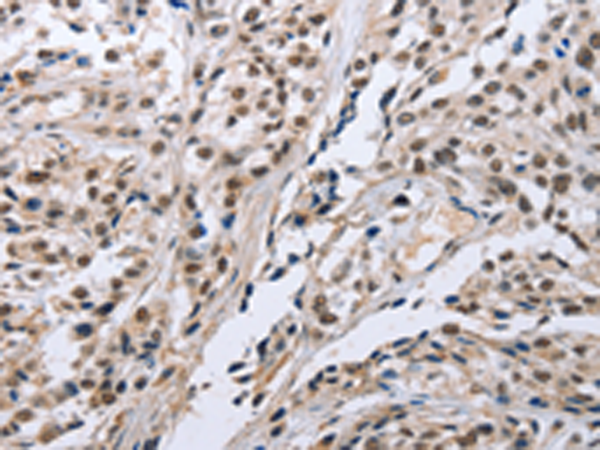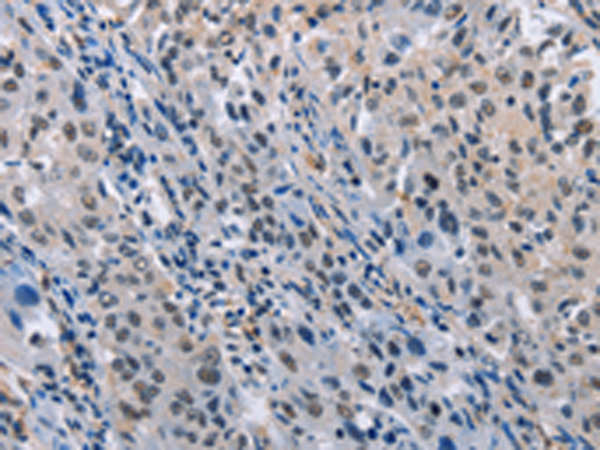

| WB | 咨询技术 | Human,Mouse,Rat |
| IF | 咨询技术 | Human,Mouse,Rat |
| IHC | 1/25-1/100 | Human,Mouse,Rat |
| ICC | 技术咨询 | Human,Mouse,Rat |
| FCM | 咨询技术 | Human,Mouse,Rat |
| Elisa | 1/2000-1/5000 | Human,Mouse,Rat |
| Aliases | FN; CIG; FNZ; MSF; ED-B; FINC; GFND; LETS; GFND2 |
| Host/Isotype | Rabbit IgG |
| Antibody Type | Primary antibody |
| Storage | Store at 4°C short term. Aliquot and store at -20°C long term. Avoid freeze/thaw cycles. |
| Species Reactivity | Human, Mouse, Rat |
| Immunogen | Fusion protein of human FN1 |
| Formulation | Purified antibody in PBS with 0.05% sodium azide and 50% glycerol. |
+ +
以下是关于FN1(纤维连接蛋白1)抗体的示例参考文献(注:内容为示例,非真实文献):
---
1. **文献名称**: *Fibronectin-1 (FN1) Antibody in Tumor Metastasis Detection*
**作者**: Smith A, et al.
**摘要**: 研究验证了FN1抗体在识别肿瘤转移中纤维连接蛋白表达升高的作用,发现其与上皮-间质转化(EMT)相关,可作为癌症预后的潜在标志物。
---
2. **文献名称**: *FN1 Antibody Targeting in Liver Fibrosis Therapy*
**作者**: Chen L, et al.
**摘要**: 探讨FN1抗体通过抑制纤维连接蛋白与整合素的相互作用,减缓肝纤维化进展,为抗纤维化治疗提供新策略。
---
3. **文献名称**: *FN1 Extracellular Matrix Interactions Revealed by Monoclonal Antibodies*
**作者**: Patel R, et al.
**摘要**: 利用单克隆FN1抗体解析纤维连接蛋白在细胞粘附和信号通路(如TGF-β)中的结构域功能,揭示其对组织修复的影响。
---
4. **文献名称**: *Development of High-Specificity FN1 Antibody for Immunohistochemistry*
**作者**: Kim Y, et al.
**摘要**: 报道一种新型FN1抗体的开发与验证,优化其在石蜡包埋组织中的染色特异性,提升纤维化疾病病理诊断的准确性。
---
如需真实文献,建议通过PubMed或Web of Science检索关键词“FN1 antibody”+具体研究领域(如cancer/fibrosis)。
The FN1 antibody targets fibronectin 1 (FN1), a high-molecular-weight glycoprotein critical for extracellular matrix (ECM) structure and function. Fibronectin exists in two primary forms: soluble plasma fibronectin, involved in blood clotting and wound healing, and insoluble cellular fibronectin, which forms fibrillar networks to mediate cell adhesion, migration, and differentiation. FN1 plays essential roles in embryogenesis, tissue repair, and cell signaling by interacting with integrins, collagen, and other ECM components. Its structure includes type III repeat domains, such as the ED-A and ED-B segments, which undergo alternative splicing in pathological conditions like cancer, fibrosis, or inflammation.
FN1 antibodies, either monoclonal or polyclonal, are widely used in research to study ECM dynamics, tissue remodeling, and disease mechanisms. They enable detection of FN1 expression and localization via techniques like Western blotting, immunohistochemistry, and immunofluorescence. Specific antibody clones may distinguish between FN1 isoforms or post-translational modifications, aiding in the investigation of tumor progression, fibrosis, or angiogenesis. Therapeutic applications are emerging, such as targeting FN1 isoforms in cancer or designing FN1-based biomaterials for regenerative medicine. However, cross-reactivity with structurally similar proteins remains a challenge, necessitating rigorous validation for experimental accuracy.
×